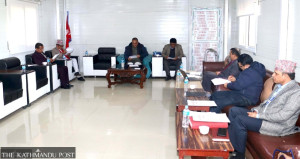Sudurpaschim Province
Rice-short residents of Saipal demand a food depot
Rice-supplier private firm Jalpa Devi Supply Company is accused of selling subsidised rice on the black market..jpg&w=900&height=601)
Basant Pratap Singh
Laksha Kami, a 54-year-old man from Dhalaun village in ward 2 of Saipal Rural Municipality, says he hasn’t been able to eat a full meal for months now. His family of 11, including seven children, eat only to survive in order to save the subsidised rice Laksha bought in January.
“Since the last week of February, we haven’t been able to eat our fill. We bought 60kg of rice but for a family of 11, the stock lasts only a month or two,” said Laksha. “We are daily wage earners and we work all day long to sustain our livelihood but still can’t manage enough to eat.”
For the first weeks after Laksha ran out of his little stock of rice, he borrowed rice from his neighbours, but now even his neighbours have only limited rice left.
“Everyone here is surviving on a limited supply of rice. Most of us are poor and can’t afford to buy rice from local shops where the price is steep,” Laksha told the Post. “The shopkeepers sell rice at Rs80-Rs200 per kg whereas we can buy subsidised rice from the depot at Rs52.”
The first consignment of subsidised rice was delivered to Saipal in January. The second and final consignment is set to be delivered by mid-June.
According to Bhugo Kami, one of the members of the rural municipal assembly, more than 50 families are facing a major food crisis in Dhalaun village alone. “Among them, Dalit families who are mostly daily wage workers are faring the worst,” said Bhugo. “The last time when a batch of subsidised rice arrived here on mules and mountain goats, those who had money bought as much as they could, but those with limited money could only buy one or two sacks.”
Like Dhalaun in Saipal-2, most of the villages and settlements in the five wards of Saipal are suffering from a shortage of rice.
The government sends subsidised rice to Saipal from Panalta of Talkot Rural Municipality, which takes mules a day to reach from Dhalaun village. Panalta is the nearest village connected to the road that connects Talkot to the district headquarters, Chainpur.
Besides the locals, the security personnel stationed in the area are also suffering from rice shortage. Security personnel at the Lasi Area Police Office in Kanda say they too have been borrowing rice from local shopkeepers.
“We are also facing a rice shortage. We are working round the clock on one meal a day. If the situation continues we will have to ask for a transfer from here because we won’t be able to perform our duties on an empty stomach,” Assistant Police Inspector Dhansin Badal at the Lasi Area Police Office told the Post. “One local businessman lent us 60kg of subsidised rice. We don’t know what we will do after the stock runs out.” There are currently nine security personnel posted at the police office.
According to the Saipal Rural Municipal Office, the government has been sending subsidised food grain to Saipal since 2017. There are about 400 families in all five wards of Saipal Rural Municipality. In the current fiscal year, 1,760 quintals of rice have been transported to the rural municipality.
Ramlal Kami, a member of the executive committee of Saipal Rural Municipality, says ideally 1,760 quintals of rice would be enough for 400 families in Saipal until the next consignment arrives, but the contractors responsible for transporting the rice secretly sold some of the rice to traders, hence the shortage.
“The businessmen in cahoots with some locals bought the subsidised rice for Rs5,200 per quintal from the Food Management and Trading Company (FMTC) and sell it for Rs20,000 to Rs25,000 per quintal to yarsagumba (Ophiocordyceps sinensis) pickers in the highlands,” said Ramlal. “Every year from mid-April to mid-July, thousands of yarsagumba pickers from all over the country come to Bajhang highlands where the businessmen sell the same subsidised rice at exorbitant rates.”
Manbir Bohara, chairman of Saipal Rural Municipality, also blames the contractors for the shortage of rice faced by the locals. This year, Jalpa Devi Supply Company was awarded the contract to supply rice in the rural municipality. The FMTC has set a quota of 2,500 quintals of rice for Saipal Rural Municipality this year, and so far 1,760 quintals have been transported. "If the contractor had distributed the rice equally to everyone in all the villages, there would be no shortage,” said Bohara. “The contractor sold the rice without any regard for poor people. Those who had money bought as many sacks as they could, and the poor, could buy only what they could afford.”
According to Bohara, the rural municipality has informed the higher authorities about the shortage of rice in Saipal and asked them to send the remaining consignments before the rainy season starts. “The rice has to be transported before the rainy season causes transportation challenges,” said Bohara.
The contractor, meanwhile, dismisses the allegations of black marketing in the subsidised rice and instead alleges negligence on the part of the rural municipality.
Devraj Joshi, the proprietor of Jalpa Devi Supply Company, denies having sold subsidised rice to traders on the way to Saipal.
Joshi says when his men delivered the rice consignment to Saipal, the local unit failed to coordinate with them, so they sold it to whoever came to buy. “We sold the rice to Saipal locals. When we reached Saipal, we tried to reach the officials of the rural municipality, but they told us to wait for a week. But we could not have waited so we sold the rice to whoever came with money. The rural municipality did not give us any clear instructions on the distribution of rice,” said Joshi.
“There were locals who had come to buy rice so we sold it to them. We have already transported 1,900 quintals of rice in Saipal, but the rural municipality says that we only delivered 1,760 quintals. We will deliver the rest of the consignment by mid-June.”
Bajhang’s Chief District Officer Narayan Pandey, who is also the chairman of the FMTC-Bajhang, said that he is discussing the issue with the local unit and the contractor.
“It is necessary to resolve the differences between the contractor and the municipal authority. The contractor said that they had to sell the rice to whoever came to buy it because there was no authorised person from the rural municipality to receive the consignment,” Pandey said. “This problem occurred in the absence of a proper distribution system. Now both parties have agreed to coordinate with each other and distribute the rice proportionately.”
It takes three days on foot to reach Saipal from the district headquarters in Chainpur. Saipal suffers from food shortage every year due to delays in transportation. During the winter, the route to Saipal is covered in thick layers of snow while the monsoon season brings disruption to transportation services caused by floods and landslides.
The locals' demand for a permanent food depot in Saipal has gone unheard for decades. The locals have also been asking the rural municipality to set a quota on how much one family can buy depending on the size of a family to prevent fraud and irregularities.
“Last winter, there was a food shortage here and the government transported rice by helicopter,” said Dolma Tamang, deputy chairman of the Saipal Rural Municipality. “But that wouldn’t have been necessary if we had a food depot here. The people's representatives of Saipal have requested Kathmandu several times and also met the prime minister and other authorities for the establishment of a depot here but have always returned empty-handed.”
Saipal Rural Municipality is the northernmost rural municipality of Bajhang adjoining China’s Tibet. It is among the most food-insecure rural municipalities and deprived in terms of health, education and sanitation.
Hima Kami, a 45-year-old single woman with nine children from Dhalaun village, has been struggling to put food on the table for herself and her children since February. Like Laksha, she too bought 60kg of subsidised rice in January. “The stock lasted a little more than a month. Then I had to resort to borrowing rice from neighbours and my landlord. Now even they don’t have any rice left to lend to us,” said Hima. “We have been surviving on nettle leaves and root vegetables for the last three months. If we had a permanent FMTC depot in Saipal, we wouldn’t have to suffer. They could stock the rice at the depot and we could buy as and when needed.”




 17.12°C Kathmandu
17.12°C Kathmandu















